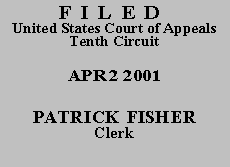

| UNITED STATES OF AMERICA,
Plaintiff-Appellee, v. DAVID M. VAKSDAL, Defendant-Appellant. |
|
"Apprendi enunciates the following rule of constitutional law: 'Other than the fact of a prior conviction, any fact that increases the penalty for a crime beyond the prescribed statutory maximum must be submitted to a jury, and proved beyond a reasonable doubt.'" United States v. Jones, 235 F.3d 1231, 1235 (10th Cir. 2000) (quoting Apprendi, 120 S. Ct. at 2362-63) (emphasis added). Thus, Apprendi principles apply only to cases that involve the imposition of a sentence more severe than the statutory maximum for defendant's offense. See, e.g., United States v. Sullivan, No. 00-8012, 2001 WL 273260, at *7 (10th Cir. Mar. 20, 2001) (holding that "Apprendi does not apply to sentencing factors that increase a defendant's guideline range but do not increase the statutory maximum"); United States v. Meshack, 225 F.3d 556, 576 (5th Cir. 2000), cert. denied, 121 S. Ct. 834 (2001), amended in part, No. 99-50669, 2001 WL 224656 (5th Cir. Mar. 7, 2001) (holding that Apprendi is not violated where a non-jury factual determination is used to enhance a sentence within the minimum statutory range).
In Vaksdal's case, the district court added additional levels to his base offense level determined pursuant to USSG § 2G2.2(a).(1) Vaksdal disputes the constitutionality of (1) two levels because the pornographic material involved a prepubescent minor or a minor under the age of 12 years, see § 2G2.2(b)(1); (2) five levels for engaging in a pattern of activity involving the sexual abuse or exploitation of minors, see § 2G2.2(b)(4); and (3) two levels because the abused or exploited minors were vulnerable victims, see § 3A1.1(b)(1). These nine additional levels were imposed based upon facts set out only in the Presentence Investigation Report, and not in the indictment.
The statutory maximum provided by 18 U.S.C. § 2252(a)(1), (a)(2), and (b)(1) for Vaksdal's offense is fifteen years; the sentence imposed upon Vaksdal was 103 months. In light of the fact that Vaksdal's sentence fell within the statutory maximum sentence, there is no Apprendi violation here. The judgment of the district court is AFFIRMED.
Entered for the Court
Circuit Judge
*. This order and judgment is not binding precedent, except under the doctrines of law of the case, res judicata, and collateral estoppel. The court generally disfavors the citation of orders and judgments; nevertheless, an order and judgment may be cited under the terms and conditions of 10th Cir. R. 36.3.
After examining the briefs and appellate record, this panel has determined unanimously to grant the parties' request for a decision on the briefs without oral argument. See Fed. R. App. P. 34(f); 10th Cir. R. 34.1(G). The case is therefore ordered submitted without oral argument.
1. Section 2G2.2 applies to "Trafficking in Material Involving the Sexual Exploitation of a Minor; Receiving, Transporting, Shipping, or Advertising Material Involving the Sexual Exploitation of a Minor; Possessing Material Involving the Sexual Exploitation of a Minor with Intent to Traffic."